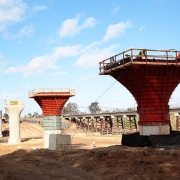This Train Won’t Leave the Station
Governor Gavin Newsom has canceled the bulk of the state’s long-proposed high-speed line between Los Angeles and San Francisco, leaving only a tail of the once-grand project—a connection between the Central Valley’s Merced and Bakersfield, not exactly major metropolitan areas. “Let’s be real,” Newsom said in his first State of the State address. “The project, as currently planned, would cost too much and take too long. There’s been too little oversight and not enough transparency.” The project’s cost, originally pegged at $33 billion, ballooned over the last decade to an estimated $77 billion (or maybe as high as $98 billion), with little reason to assume that the cost inflation would end there.
This effectively puts an end to former governor Jerry Brown’s “legacy” project, the lone tangible accomplishment for a second gubernatorial stint that had been far better at raising taxes and imposing draconian legislation than building things. Brown wanted to build his beloved train in a state with some of the nation’s worst roads (despite its second-highest gas taxes), a deteriorating water-delivery system, and massive pension debt. With Brown finally in retirement, Newsom took the opportunity to free up billions of dollars that his Democratic allies would like to spend in other ways.
Perhaps the most critical national casualty may be the Green New Deal proposed by New York congresswoman Alexandria Ocasio-Cortez. Much of her platform for a ten-year transformation of the American economy centers on transportation. In her bid to kill the internal-combustion engine, Ocasio-Cortez apparently seeks to eliminate both cars and planes. Her favored solution for cross-continental travel: a massive network of high-speed trains.
Read the entire piece at City Journal.
Joel Kotkin is the Roger Hobbs Distinguished Fellow in Urban Studies at Chapman University and executive director of the Houston-based Center for Opportunity Urbanism. He authored The Human City: Urbanism for the rest of us, published in 2016 by Agate. He is also author of The New Class Conflict, The City: A Global History, and The Next Hundred Million: America in 2050. He is executive director of NewGeography.com and lives in Orange County, CA.
Wendell Cox is principal of Demographia, an international public policy and demographics firm. He is a Senior Fellow of the Center for Opportunity Urbanism (US), Senior Fellow for Housing Affordability and Municipal Policy for the Frontier Centre for Public Policy (Canada), and a member of the Board of Advisors of the Center for Demographics and Policy at Chapman University (California). He was appointed to three terms on the Los Angeles County Transportation Commission, where he served with the leading city and county leadership as the only non-elected member. During that time, he authored the amendment that created the Proposition A 35% set aside that established the first local funding for the rail system. His involvement on the Commission is detailed in Transit in Los Angeles.
Photo: California High-Speed Rail Authority [Public domain], via Wikimedia Commons


 Public Domain
Public Domain